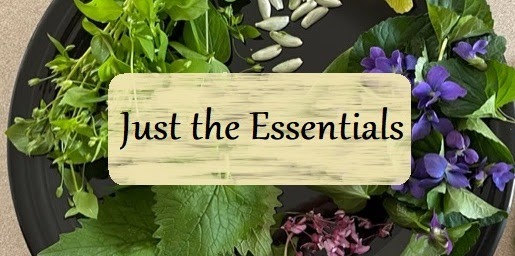From our FREE 4/24/23 “Just the Essentials” newsletter that you can sign up for on our website. Incorporating Wild PlantsWe were lucky in many ways to have had
the grandfather we did, but especially because of his appreciation for
found food. He suddenly found himself with 6 extra mouths to feed (Mom
and the 5 of us) and he wasn’t above picking up that pheasant or rabbit
that just got hit in front of the house, or snagging a couple dozen ears
of very young field corn for the table. He could always find fruit and
nuts. It shouldn’t be surprising that it rubbed off on me. For some
reason, Maryanne is a little more hesitant.We’d gotten away from
those things for many years until we got involved in herbs during the
early 90’s and somehow found ourselves at a meeting of The Herb Nerds on
a farm across the Susquehanna river. It was a potluck, and the star of
the table was a salad with pansies and violets. Shortly after that, we
went to an Int’l Herb Assoc. conference in SC, and I saw a book on wild
foods by Billie Jo Tatum that lit my fire. From that moment on,
foraging was my “thing.” One of the easiest ways to get started is to ADD one or many wild
edibles to a regular salad. If you try something and don’t like it, you
can easily eat around that. I think they make a salad just beautiful,
and full of flavor and nutrition. The leaves that are young are most
tender and flavorful. Flowers are a great addition. If you decide to
try maple seeds, you can use them raw, or roast them first. The ones
shown here are a little bitter because they’re large, but in a salad,
sometimes a little bitter is good!Mild but pleasant tastes: violet flowers and leaves garlic mustard young dandelion leaves (try flowers in fritters) chickweed redbud flowers maple seeds Note: If you grow horseradish, the leaves are good to eat before they’re too big.6″ is perfect. Fresh or in cooked dishes – don’t miss out on them!You could also try
plantain, daylilies (wild), forsythia, strawberry leaves, wild mustard,
pine or spruce tips, Jerusalem artichokes, wild onions, dead nettle, and
other well-known greens/plants that may grow where you are (miner’s
lettuce comes to mind). The list is pretty long and changes as the
growing season progresses.
Here is a bed of various
spring lettuces and some carrots with the foraged “weeds” topped with a
scrumptious goat cheese a friend made with preserved lemons. It could
also include radish, cucumber, tomato – etc.! Want to make a special oil and vinegar dressing? Start with this vinegar. Use 3 parts oil to 1 part vinegar. In this case we use chives, but you can use any herbs or spices. Mustards and wild onions are good addition!Last
but not least, we have a few seasonal items in the SPECIALS category
that are 10% off through Sunday, April 30, 2023. Only items in that category
apply. Outdoor Survival KitGardener’s KitPrinted Cotton TotesHiker’s ReleafTeas (Snuffles is great for hayfever)and Wild Foods for Every Table book pdf
Sorry, we don’t ship physical goods outside the US.
The newest issue went out last week. If you are not a subscriber, you’re missing some pretty great stuff! Have a great spring. It’s here.


